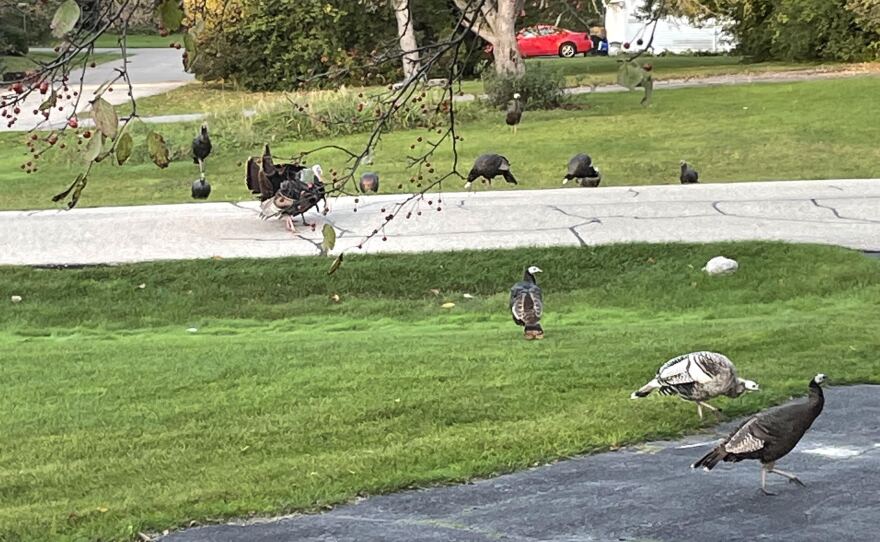Thanksgiving brings frozen and farm-fresh turkeys to tables throughout the U.S.—but Michiganders, even in cities, have already been seeing wild ones wandering down streets and up driveways. Are we crazy, or are we really seeing wild turkeys where we’ve never seen them before? And… are they tasty? We had so many wild turkey questions, so we turned to turkey expert Al Stewart, Director of the Nimrod Education Center at Hillsdale College.
Here are the answers to all our burning turkey questions:
How many wild turkeys are there currently in Michigan?
About 200,000. That’s up from the historical estimated high of 90,000, and way up from the historical low. Michigan’s native wild turkey population was decimated by overhunting in the 19th century, to the point where turkeys were deemed extinct here after a final sighting in Van Buren county in 1897.
Today’s Michigan turkeys are mostly descendants of birds trapped in Iowa, Missouri, and Pennsylvania. Citizen groups of hunters, conservationists, and the Department of Natural Resources worked to bring turkeys back throughout the 20th century, but it was a concerted effort starting in 1983 that really rebuilt the population.
Where do Michigan’s turkeys live?
You can find wild turkeys in every county throughout the state. Turkeys spend most of their waking hours on the ground, but they roost in trees at night. They’re particularly fond of areas with blended oak woods and agriculture. But, Michigan’s turkeys are increasingly creeping into urban environments, too—that’s really happening, not just anecdotal illusion.
“They’re survivors,” said Stewart. “They are coming closer to town and in closer association with people. Usually there’s a food source someplace that brings them in.”
“Over time, they have been able to acclimate themselves to the town.”
Aside from humans, what other animals eat turkeys?
Great horned owls are one of the turkey’s main natural predators. Raccoons, opossums, and skunks also eat turkey eggs. Even household cats roaming outdoors will eat baby turkeys, who become much less vulnerable after developing their flight capacity at about two weeks old. Wild turkeys live to be about 18 months old.
How smart are turkeys?
Depends on who you ask, but probably smarter than you think. “Although people don't give them that credit, they're very, very smart for an animal that has a brain the size of a walnut,” said Stewart. “They're exceptionally wise.” They’ve also got excellent hearing and eyesight. Smell? Not so much.
Are wild turkeys dangerous?
Male turkeys sometimes fight for dominance over turf during the spring mating season, but turkeys tend to be pretty peaceful otherwise. “They like to try to bluff you a little bit,” Stewart said, “but the reality of it is that...there's an awful lot of show there. They don't have any teeth, so it's not like they're going to eat you.”
We still don’t recommend getting in their faces, though.
Why do turkeys gobble?
Only male turkeys (called toms) gobble. Female turkeys (called hens) make a sound called a yelp, followed by clucks. Toms do the most gobbling in the spring. It’s a mating call, and toms like to attract as many hens as they can in a season.
Want to know what they sound like? Listen to Al Stewart on Stateside. He does a pretty mean imitation.
Maybe most critically… are they delicious?
“Wild turkeys are exceptional. The flavor is excellent,” said Stewart, who described the taste as nutty and nothing like a Butterball. He eats and appreciates a grocery store turkey, too. “But there's nothing greater than to be able to take a bird that I harvested and share with my family at Thanksgiving.”
Correction: An earlier version of this post incorrectly quoted the historical estimated high as 900,000. It should have read 90,000. It has been corrected in the copy above.







